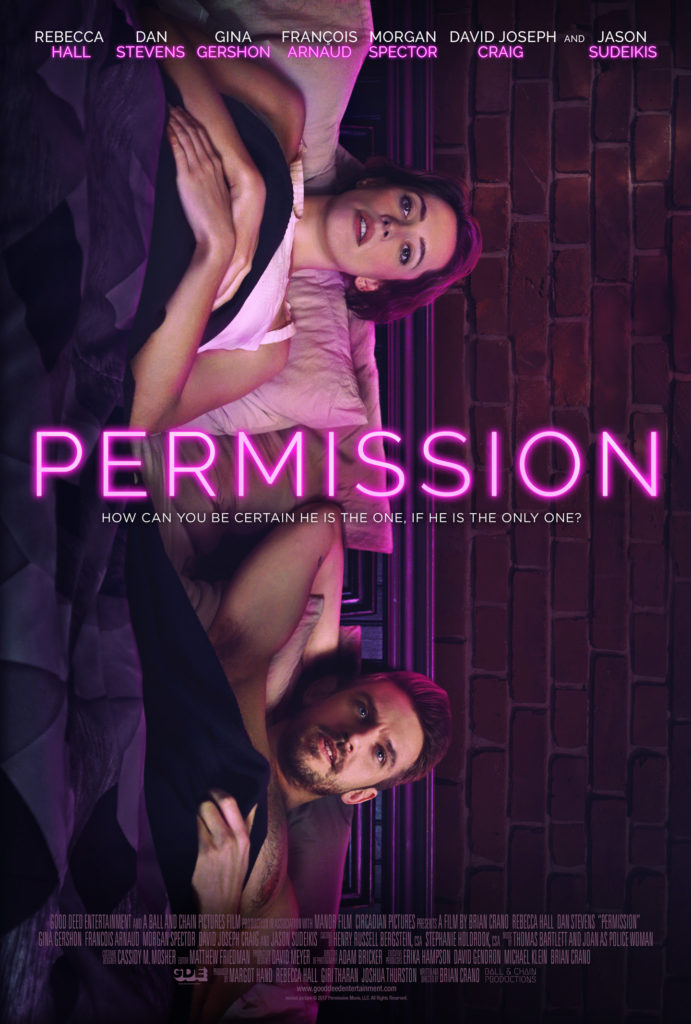Permission – Movie Review: A Different Rom-Com About Relationships and Growing Up
For me, Permission ended up being a pleasant surprise as a film that talked about what it meant to be in a relationship and growing up in a manner that felt very real. What if the grass really is greener on the other side?
First, I have to talk about how glad I was to see so many familiar faces in Permission. I only knew it starred Dan Stevens (Legion) and Rebecca Hall. However, as the movie progressed seeing Morgan Spector, Gina Gershon, Jason Sudeikis, Raúl Castillo and François Arnaud made me enjoy it more.
Permission is directed and written by Brian Crano. The out director does an impressive job of making the audience rethink how society defines relationships as well as how people might confuse ‘familiarity’ with being happy and in love.
The film starts with introducing Anna (Rebecca Hall) and Will (Dan Stevens). The two have been a couple for a long time. They were each other’s firsts and have been together ever since. The two also can’t stop saying how much they love each other. Will decides to pop the question on Anna’s 30th birthday during dinner with their friends Reece (Morgan Spector) and Hale (David Joseph Craig). Reece is Will’s work partner and Hale’s boyfriend, who is Anna’s brother. Knowing that Morgan is Rebecca’s real-life husband while David is Brian’s added to my interest in the movie as I watched the characters interact onscreen.
Before Will can ask Rebecca to marry him, Reece talks about how boring Will and Anna are. He even goes on to suggest the two try sleeping with other people and see what’s out there. The two already love each other and are bound to get married soon, so there’s no harm, right?
Providing an answer to that question is where the script really works. I really enjoyed the points Brian Crano brought up. Permission talks about the possible vulnerability of monogamous relationships, defining yourself by looking at the person you want to be with, how not everyone is capable of handling an open relationship, the surprise when your partner wants something different, and so much more.
Anna meets Dane (François Arnaud) while Will meets Lydia (played by the ever-stunning Gina Gershon). What started out as a casual experiment to try being with other people before marriage soon turns into something that not only becomes confusing to handle but also shines a light on what Anna and Will really want.
The thing I appreciated about Permission is that it doesn’t pick sides. The film doesn’t tell you about what makes the best relationship or that you shouldn’t even be in a relationship in the first place. It simply talks about different options and leaves the audience to decide for themselves. Whether you want to be monogamous or not, the important thing is doing what makes you happy.
A story such as Permission could have fallen apart if the characters weren’t well-written. There is no ‘bad guy’ in the film. Every character comes across as human and I think that’s what will help the audience relate to them or understand the decisions they make. One moment you might side with Anna, and in the next, you might give all your support to Will. However, by the end of the film, I do think you will realize there wasn’t necessarily a side to pick and each character was just trying to figure out life and hopefully grow for the better.
Even the supporting cast brings something to the story. I liked Dane as a musician who wants to know more about Anna and begin a relationship. Lydia, the older woman, has a past that helps add layers to her character and how she acts.
Another thing I really liked is how Permission handled the queer couple. Reece and Hale aren’t pushed to the background as the gay best friends, only appearing to offer advice to the straight leads. The two have their own arc going on with Hale wanting children and Reece not understanding how to adjust to such a change. We also see Hale forming a bond of friendship with a straight stay-at-home father Glenn (Jason Sudeikis) as he tries to decide what to do next. I loved Hale’s line about growing up while in being in a relationship and the difficulty one experiences when the person you love doesn’t want what you want.
Coming to the direction, even though the film is set in a bustling city, the story itself feels very contained. There are no unnecessary cast members popping up onscreen which helps keep the audience’s attention on the main characters and what they’re going through. I also enjoyed how the background was used to relate to the character’s emotions. The scene where a waiter shatters a tray of glasses when Will and Anna talk about their decision to meet other people is hilarious. The film also doesn’t shy away from male nudity, which is something to be appreciated when it comes to a genre that seems to be more focused on objectifying women. Furthermore, all of the color and appeal in the settings felt like a great way to mess with the audience and make them question why a character would want to leave it behind.
Permission takes the concept of couples giving each other a free pass and presents it in a manner that makes them question what they want in life. Is linking the definition of who you are with the person you love really such a romantic idea or is it something unhealthy? Permission might not offer you clear answers for everything but I appreciate it asking the questions and letting the audience decide on their own.
Have you watched Permission yet? Let us know.
Author: Farid-ul-Haq
Farid has a Double Masters in Psychology and Biotechnology as well as an M.Phil in Molecular Genetics. He is the author of numerous books including Missing in Somerville, and The Game Master of Somerville. He gives us insight into comics, books, TV shows, anime/manga, video games, and movies.
Help support independent journalism. Subscribe to our Patreon.
Copyright © The Geekiary
Do not copy our content in whole to other websites. If you are reading this anywhere besides TheGeekiary.com, it has been stolen.Read our







